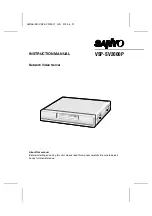
LOG_event
Application Program Interface
2-189
C Interface
Syntax
LOG_event(log, arg0, arg1, arg2);
Parameters
LOG_Handle log;
/* log objecthandle */
Arg
arg0;
/* copied to second word of log record */
Arg
arg1;
/* copied to third word of log record */
Arg
arg2;
/* copied to fourth word of log record */
Return Value
Void
Reentrant
yes
Description
LOG_event copies a sequence number and three arguments to the
specified log buffer. Each log message uses four words (eight words for
’C55x large and huge models). The contents of the four words written by
LOG_event are shown here:
You can format the log by using LOG_printf instead of LOG_event.
If you want the Event Log to apply the same printf-style format string to
all records in the log, use Tconf to choose raw data for the datatype
property and type a format string for the format property (see “LOG
Object Properties” on page 2-184).
If the logtype is circular, the log buffer of size buflen contains the last
buflen elements. If the logtype is fixed, the log buffer contains the first
buflen elements.
Any combination of threads can write to the same log. Internally,
hardware interrupts are temporarily disabled during a call to LOG_event.
Log messages are never lost due to thread preemption.
Example
LOG_event(&trace, (Arg)value1, (Arg)value2,
(Arg)CLK gethtime());
See Also
LOG_error
LOG_printf
TRC_disable
TRC_enable
LOG_event
Append an unformatted message to a message log
Sequence #
arg0
arg1
arg2
LOG_event















































